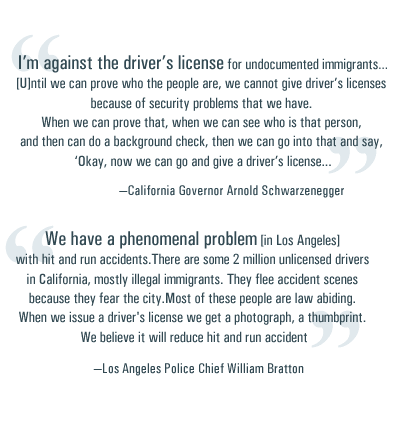Driver's Licenses and Unauthorized Immigrants

Each state requires its drivers to have a license.
(Shutterstock.com)
Read an article about driver's licenses and unauthorized immigrants here
Background
State governments traditionally have regulated driving. They, not the federal government, issue driver's licenses.
A person residing in the U.S. cannot drive a car legally without a driver's license. Because official estimates show that there are approximately 12 million undocumented immigrants in the U.S., states have increasingly had to address the issue of whether to issue driver's licenses to them.
Overview of the Controversy
Many people have advocated that to effectively address the issues surrounding unauthorized immigration, states should allow all immigrants to obtain driver's licenses. Some states, such as Hawaii and Illinois, already have. Supporters of this position argue that it will help the economy by easing burdens on commuters and also by allowing immigrants to use licenses as identification to open bank accounts. It would also increase public safety by requiring them to purchase auto insurance. Opponents argue that a driver's license not only legitimizes an illegal act (unauthorized immigration), it also interferes with the federal government's role in regulating immigration and makes it easier for potential terrorists to get a valid form of ID.

Controversy in Focus: The REAL ID Law
In 2005, Congress passed a law that would significantly affect the issue of driver's licenses and immigration. Concerned about national security and the ability of potential terrorists to obtain legal documentation, Congress passed the REAL ID law as part of a larger defense and terrorism bill. REAL ID established national standards for states to follow in determining who is eligible for a state-issued driver's license. Only those states that agree to the standards could issue licenses valid for federal services and for boarding planes. As of 2008, no states have complied with the requirements, because many in the state legislatures think the requirements create hardships on the states.


